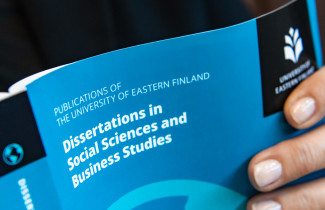The doctoral dissertation in the field of Nursing Science will be examined at the Faculty of Health Sciences at the Kuopio campus.
What is the topic of your doctoral research? Why is it important to study the topic?
The topic of this study, health behaviours among adolescents in Ethiopia, is very important for many reasons. Splendid health begins with health promoting behaviours while the poor state of health starts with health risk behaviours. Health behaviours determine our health, wellbeing, and quality of life. These health behaviours are created in specific times, geographic locations, culture, physical, social, economic, and political conditions of people. Health behaviours are established in the early years of life (childhood and adolescent period) and behaviours started during adolescence are maintained throughout the lifespan. Adolescent health promotion is one of the key strategies to improve global health since health risk behaviours in adolescents will contribute to adverse health conditions in adulthood. Thus, this study is important in improving our understanding and knowledge about the proliferation of health risk behaviours and the leading contributors to health risk behaviours that enflame poor health conditions and the emerging of health inequalities in early years.
What are the key findings or observations of your doctoral research?
The finding of this study suggested that the distribution of health risk behaviours varies by gender, areas of residence, types of occupations, and education levels of parents, religion, living conditions, grade levels, and age.
Health risk behaviours including food insecurity, poor hygiene, sleep deprivation, cigarette smoking, drug use, excessive alcohol consumption, risky sexual behaviour, sedentary behaviours were most widespread among male adolescents.
Adolescents from the rural area were at heightened risk for food insecurity, excessive alcohol intake, people have smoked in their presence, risky sexual activity (no or inconsistent condom use), bullying, feeling lonely, feeling sad, hopeless, and stopped doing their usual activities.
Adolescents whose parents were farmers, daily labourers, and pensioners, and adolescents who studied in General Secondary School were at heightened risk for food insecurity.
Health-risk behaviours such as smoking cigarettes, being slipping into trouble with family, friends, peers, teachers, fighting, and becoming sick because of binge alcohol intake, multiple sexual partners, and sedentary behaviour were common among urban adolescents.
Living alone was associated with people smoked in their presence, alcohol drinking, and practice of unsafe sexual behaviour. Adolescents from the Muslim religion were at higher risk for using drugs.
Therefore, tailored health promotion interventions by public health policymakers, public health interventionists, and other professionals in adolescents’ settings of everyday living should be considered to reverse the widespread health risk behaviours among adolescents in Ethiopia. This is important because risk behaviours such as smoking, alcohol intakes, lower fruit and vegetable intake, physical inactivity are the main causes of physiological risk factors namely, elevated cholesterol levels, high blood pressure, diabetes, and obesity, which are established during adolescent period and path to adulthood. Thus, the prevention of present and future non-communicable diseases among the global population could be effectively addressed by the modification of the physical, social, and organizational settings of the adolescents before health risk behaviours are instilled and ingrained into their everyday life and become insuperable to deal with them successfully.
This study is significantly important for the purpose of whetting and inspiring intellectuals and community conversation among community members, researchers, health professionals, and policymakers to debate, think, discuss, explore, exchange opinions & ideas, and find innovative ideas and practices around and about adolescents’ health, wellbeing, and quality of life.
Also, this study will encourage the family, community, and nation to heed or pay uppermost attention to adolescent development by showing research direction associated with adolescent health and wellbeing by providing stimulating ideas to future researchers in various disciplines in Ethiopia. So, this study will motivate a wide range of researchers and experts to engage in scientific exploration and discovery of knowledge and then develop interventions to improve, protect, and promote adolescent health and welfare.
The research areas in the future for adolescents should include health risk behaviours (smoking, alcohol use, drug misuse, sexual health), communication between parent and adolescent, depression and mental health, violence, physical activity, nutrition and obesity, and health inequalities and social exclusion.
How can the results of your doctoral research be utilized in practice?
This cross-sectional study is useful to describe, explain and examine variations in the frequency of health risk behaviours across gender, areas, age, living conditions, and social status. Thus, the adaptation of health risk behaviours by the individuals should be taken as an early warning sign of a poor state of health among the population now and in the future. For example, an increase in smoking rates among the population suggests an increase in lung cancer, cardiovascular and stroke in the future, diminished lung and physical capacity and bronchitis now, poor academic performance and cognitive impairment among young people and financial difficulties for smokers and their households. Similarly, an increase in excessive alcohol intake suggests an uptick in accidents, injuries, suicides, crime, domestic violence, rape, murder, and unsafe sex in the short term and heart diseases, diabetes, and liver diseases and economic problems in the distant and near future. Also, adolescents, in particular, schoolgirls who engaged in risky sexual behaviours (onset of sexual activity at an early age before age 16, no or inconsistent condom use or other contraceptive devices and multiple sexual partners) are at the highest risk of rape and abuse by partners, mistreatment, unwanted pregnancy, infection with STIs and HIV/AIDS and perilous pregnancy disorders. Therefore, the new knowledge this study brought around health behaviours among adolescents in Ethiopia could be used as a helpful tool to design appropriate health promotion interventions to promote adolescent health and quality of life in their settings.
What were the key research methods and materials used in your doctoral research?
A cross-sectional survey of randomly selected 927 adolescents aged 11-17 years was conducted attending urban and rural high schools in 2010. The data were collected using the Global School Health Survey (GSHS) questionnaire. The GSHS questionnaire was pilot tested on 30 adolescent students who had similar ages with the present study population (15 on Amharic speaking adolescents and 15 on Oromo language-speaking adolescents) in Ethiopia before it was administered in nominated schools. The GSHS questionnaire consists of 49 multiple-choice questions 10 questions on sociodemographic factors and 39 questions about health behaviours. The data were analyzed using cross-tabulation to determine the distribution of health behaviours and a logistic regression model to examine the relationship between sociodemographic factors and health behaviours using SPSS version 25.0. The findings were presented as frequencies (N) and percentages (%) and odds ratios (OR) and 95% confidence intervals (CI).
The doctoral dissertation of Jembere Berhanu Belihu, entitled Health behaviours among adolescents in Ethiopia, will be examined at the Faculty of Health Sciences. The Opponent in the public examination will be Professor Katja Joronen of the University of Turku, and the Custos will be Docent Päivi Kankkunen of the University of Eastern Finland. The public examination will be held in English at the Kuopio Campus on 18 February 2022 and it will be streamed online.



